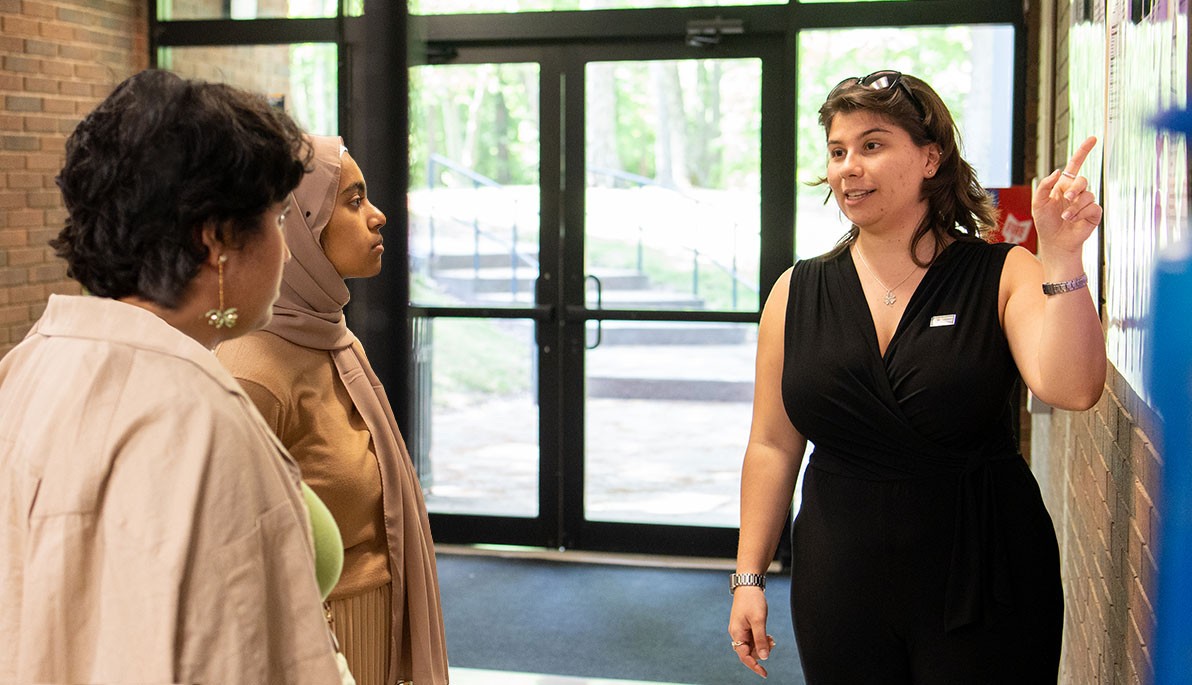News
Mini-Research Grant Program for High School Students Thrives
June 5, 2023
Pictured: Biology major Anna Makedonska, right, presents a poster to attendees.
Continuing its commitment to undergraduate research and building a pipeline for students to pursue science, technology, engineering, and math (STEM) fields, New York Tech has completed the sixth year of its Mini-Research Grant Awards (MRGA) program. Research projects were received from 18 high schools in New York, New Jersey, and Connecticut, with awards granted to 28 projects from 15 high schools.
The $300 awards, made possible through the support of the American Association of University Women, are applied to expenses the high school student-researchers incurred during new or continuing research in STEM and related disciplines this academic year.
Applications for the grants opened in September 2022; the review, selection, and award processes were completed by February. During that time, the high school students working on research projects visited New York Tech’s New York campuses last fall and again in February.
Additionally, as part of this year’s program, 23 grant awardees from eight tri-state area high schools and their teachers visited New York Tech’s Long Island campus on May 12 to present their research to members of the New York Tech community. Awardees displayed posters and described their research to guests. The high school students visited the Entrepreneurship and Technology Innovation Center (ETIC), led by ETIC Director Michael Nizich, Ph.D., to hear about New York Tech students’ computer science and engineering research projects, and attended a life sciences research showcase presented by New York Tech students conducting research with Associate Professor Bryan Gibb, Ph.D.
MRGA applications, either by an individual student or group of students, must pertain to research in biology, molecular biology, biotechnology, engineering and computer science, biomedical engineering, chemistry, or health-related. Topics of MRGA research projects presented on May 12 include:
- Simplistic Manipulative Accelerated Airfoil Control (Cold Spring Harbor High School)
- Bacterial Growth in Different Types of Water (Queens High School for the Sciences)
- Effects of Gyro-Stabilization on Hand Stability and Dexterity (Roslyn High School)
- Using Zeolite Clinoptilolite to Reduce Methane Emissions from Food Waste (Norwich Technical High School)
- How Agricultural Runoff Affects the Oceans Biodiversity (Norwich Technical High School)
- Evaluating the impact of Carbon – Nitrogen Levels in Phragmites Australis Rhizomes of Restored and Invaded Wetlands (Brentwood High School)
- The Effects of Varying Nitrate Concentrations on Tritia obsoleta (Brentwood High School)
- Microplastic Consumption in Alpheus randalli (Bergen County Academies)
- Synthesis of Stable MXene and Filtration by GO-MXene Hybrid (Bergen County Academies)
- Creating a Cost-Effective Device for the Translation of ASL to English (Bethpage High School)
- Building an Arduino Powered Water Purity Sensor that can test pH, Turbidity, and Dissolved Oxygen (Bethpage High School)
- Investigating the Role of Sunlight and LEDs in Planarian Regeneration (Bethpage High School)
- Effects of Nitrogen Oxide and Particulate Matter on Respiratory Health (Uniondale High School)
Members of New York Tech’s MRGA review committee include Niharika Nath, Ph.D., professor of biological and chemical sciences who oversees the program; Rosemary Gallagher, D.P.T., Ph.D., associate professor of physical therapy; Wenjia Li, Ph.D., associate professor of computer science; and Amy Bravo, senior director of career success and experiential education.
New York Tech students who assisted in the grant review process are biology students Faiza Nasir, Dono Shodieva, and Angel Singh, and life sciences/biomedical engineering student Mary Margarette Sanchez.
Applications for the 2024 Mini-Research Grant Program will be accepted beginning in September.





